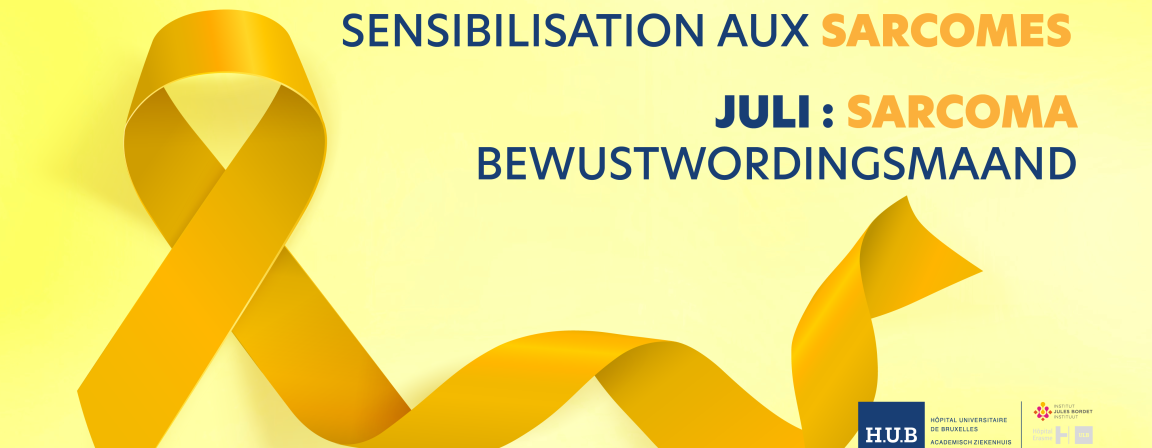Sarcoma Awareness Month at HUDERF: tackling poor prognosis on a large scale
Excellent news from our paediatric oncology team on the occasion of this month of July dedicated to sarcoma: It is now heading at Belgian level a major international study to explore new and innovative treatment options for children with rhabdomyosarcoma, a rare cancer of the soft tissue.

Although the survival rates for patients with localised rhabdomyosarcoma are very good, the survival prognosis for patients with very high risk rhabdomyosarcoma, such as those with metastatic rhabdomyosarcoma, remain disappointing. The HUDERF paediatric oncology teams are now engaging, in cooperation with an international team of experts, in a new battle to obtain improved survival results. Simultaneously exploring a number of new treatment options, the study that the HUDERF will now be heading will include 850 newly diagnosed children and 420 relapsed patients over a period of seven years and cover Europe, Australia, New Zealand and Canada. This international study was officially launched in Belgium on 4 July 2023 via the BSPHO (Belgian Society of Paediatric Haematology Oncology) coordination unit by the team at the HUDERF Paediatric Oncology Department with the support of Kick Cancer. The team is continuing to build on the solid bases of a study published in 2023 [1] which explains the long-term survival rate of paediatric patients with rhabdomyosarcoma in terms of risk group, clearly highlighting patients likely to benefit from new treatment regimens.
Combating poor prognoses on a large scale
Rhabdomyosarcoma is a rare cancer that principally affects children. At present, patients with low risk or standard risk rhabdomyosarcoma have a cure rate of above 80%. For patients whose rhabdomyosarcoma is at an advanced stage or with a poor prognosis, the teams participating in this study are acting to study drug combinations, including innovative drugs, which will make it possible to improve the chances of recovery while offering patients the most suitable treatment and rapidly discontinuing innovative treatment that is not having the hoped-for effect. "We are convinced that given the rarity of this pathology, the inclusion of the greatest number of patients in this academic, multicentre and international study on a large scale will enable us to find and propose more effective or targeted treatment for more patents affected by serious and advanced forms of this sarcoma that we still find difficult to control. We also want to investigate further, anticipate and avoid relapses, provide more treatment options adapted for children and share on a large scale the successes and failures so that the beneficial results are more rapidly applicable," explains Dr Christine Devalck, head of the Paediatric Oncology Department at the HUDERF.
The importance of clinical trials in an academic environment
During this Sarcoma Awareness Month, the specialised oncology teams at the HUDERF and the Jules Bordet Institute will be wearing a yellow ribbon as a sign of their support for their patients, but also to stress the importance of supporting pertinent clinical trials among children at national and international level. Academic studies make it possible to look at current treatment that may not always be proving effective in children, but also to register all the data concerning the effects of the medicines tested so as to measure their effectiveness and monitor an acceptable toxicity in an international register. The present study results will be recorded in the SACHA register.
HUDERF, reference centre for paediatric cancers
A reference centre for the treatment of cancers in children and adolescents within the H.U.B, the HUDERF Paediatric Oncology Department has JACIE accreditation and is a member of the European Reference Network (ERN PaedCan) that brings together European professionals so that they can share good practices and treat and support children with rare or complex cancers. Within the H.U.B, teams from the HUDERF, the Jules Bordet Institute and the Erasmus Hospital mobilise to continue to develop excellence of care and widen the frontiers of medical treatment.
To find out more about Sarcoma Awareness Month at the Institut Jules Bordet within the H.U.B
[1] Nonmetastatic Rhabdomyosarcoma in Children and Adolescents: Overall Results of the European Pediatric Soft Tissue Sarcoma Study Group RMS2005 Study | Journal of Clinical Oncology (ascopubs.org)